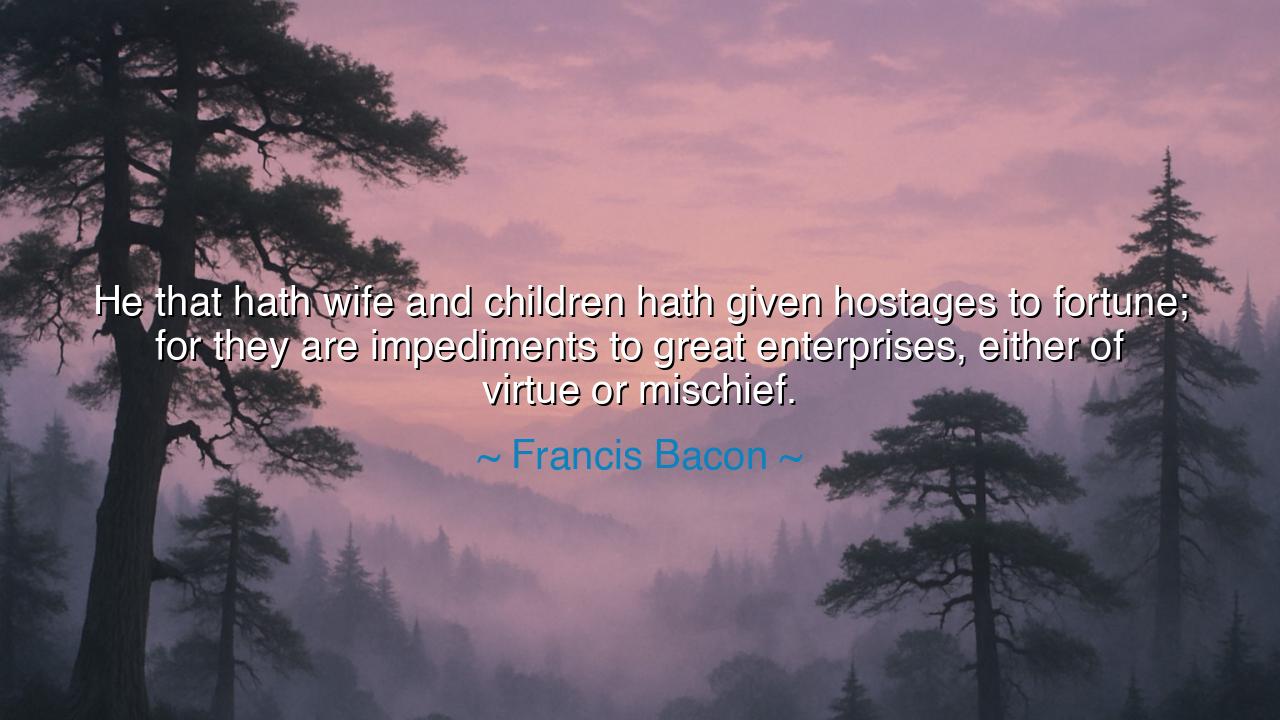
He that hath wife and children hath given hostages to fortune;
He that hath wife and children hath given hostages to fortune; for they are impediments to great enterprises, either of virtue or mischief.






The words “He that hath wife and children hath given hostages to fortune; for they are impediments to great enterprises, either of virtue or mischief,” spoken by Francis Bacon, echo with the austere wisdom of a philosopher who had seen the deep interplay between duty and ambition, between love and freedom. At first, his words seem cold — even cruel — as though the bonds of family were shackles upon the soul. Yet beneath their severity lies a profound meditation on the nature of human responsibility. Bacon speaks not against love or kinship, but about the price of attachment: that to love deeply is to give the world the power to wound you, and to bind your actions not to your will alone, but to the fates of those you hold dear.
To understand Bacon’s meaning, one must recall the age in which he wrote — the late Renaissance, a time when men of intellect and ambition sought to rise through the perilous courts of kings and empires. Fortune was not a gentle goddess, but a tempestuous mistress who raised men to glory one day and cast them to ruin the next. To be great in that age — to pursue the highest enterprises of virtue or mischief — one often needed the ruthless freedom to risk all. The man with no attachments could gamble with his life, reputation, or soul. But the man with wife and children, Bacon reminds us, carries hostages to fate — for every bold step he takes endangers those who depend upon him. The flame of daring must dim when the heart knows it could burn those it loves.
The ancients knew this truth well. Consider Julius Caesar, who crossed the Rubicon not merely as a general, but as a man who had already sacrificed much of his personal peace for ambition. His family ties could not hold him from the storm of destiny, for he had long learned to sever affection from action. Contrast him with Marcus Aurelius, the philosopher-emperor, whose meditations reveal a man torn between the stoic demands of duty and the tenderness of a father. He wrote often of the need to act as though one were already dead — detached, unafraid — yet he also spoke of his children with deep concern. His greatness as a ruler was tempered by the weight of care; his sword of reason blunted by compassion. In him, as in Bacon’s words, we see that love and ambition are often at war within the same heart.
But Bacon does not condemn family. He only points to the paradox of love: that it both enriches and restrains the human spirit. A man without ties may pursue the stars, but he risks losing his soul to the coldness of solitude. A man with a family may walk more carefully, but his heart beats with deeper purpose. To have “given hostages to fortune” means that one’s happiness and safety are no longer one’s own; they are entrusted to the mercy of chance, of time, of mortality. In this sense, every parent, every lover, is a warrior who has laid his heart upon the altar of uncertainty. It is not weakness, but sacrifice — a quiet courage more profound than conquest.
History offers a thousand proofs of this truth. The explorer Ernest Shackleton, who led his crew across the frozen wilderness of Antarctica, turned back from ultimate glory to save his men when their ship was lost in ice. His family waited at home, his reputation hung in the balance, and yet he chose the path of loyalty over fame. His enterprise of virtue was shaped not by freedom from attachment, but by the nobility of responsibility. He could not act as a man alone; he acted as one who bore the weight of others’ lives. Bacon’s words remind us that such weight, though it slows the ascent to greatness, also anchors us to what is truly human.
In the same breath, Bacon acknowledges that such attachments also prevent “enterprises of mischief.” For the man who loves cannot so easily betray, destroy, or corrupt. The tyrant who feels no tie to family or to fellow men acts without restraint. But one who has looked into the eyes of his child, or felt the hand of his beloved, will think twice before loosing ruin upon others. In this way, family becomes both chain and compass — limiting freedom, yet guiding conscience. The hostage to fortune becomes also the guardian of virtue.
Thus, the lesson of Bacon’s saying is not to shun love, but to understand its cost. Every bond is both burden and blessing. To love is to surrender some measure of freedom; to pursue greatness without love is to risk losing humanity. The wise man, therefore, must learn balance — to strive greatly, but not cruelly; to love deeply, but not fearfully. He must walk the narrow path between duty and destiny, accepting that the higher he climbs, the more the winds of fortune will test his heart.
So, let us take from Bacon’s austere wisdom a gentler truth: that the one who gives “hostages to fortune” also gives meaning to life. The unbound spirit may soar farther, but the bound heart shines brighter. To live for oneself alone is to live lightly, like a leaf; to live for others is to root oneself in the soil of eternity. The hostages we give to fortune — our loves, our families, our promises — are also the treasures that make our risk worthwhile.






AAdministratorAdministrator
Welcome, honored guests. Please leave a comment, we will respond soon